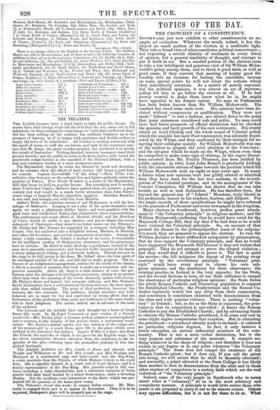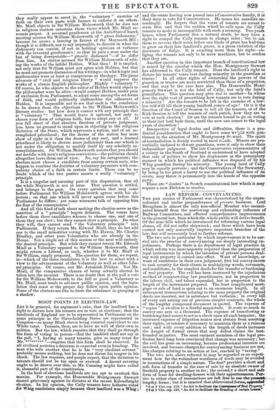TOPICS OF THE DAY.
THE CROTCHET OF A CONSTITUENCY.
SOUTHWARK just BOW exhibits to other constituencies an ex- ample ad evitanclutn. Whatever the result, indeed, it has dis- played no small portion of the electors in a creditable light. They take a broad view of what constitutes political concurrence— not expecting a servile identity of sentiment in every detail of opinion, but a general similarity of thought, and courage. to put it forth in act. But a smaller portion of the electors seem to take a less intelligent and generous view of Sir William Moles- worth's going among them, and to think it good taste, as well as good sense, if they convert that meeting of hearty good fel- lowship into an occasion for baiting the candidate, because on some special points he will not adopt the notions which they individually entertain. As a matter of merely expound- ing his political opinions, it was almost an act of superero- gation for him to go before the electors at all. If he had merely wanted to make them know what he is, he might have appealed to his former career. No man in Parliament has been better known than Sir William Molesworth. His conduct has stood some stern tests. His opinions have been de- clared without compromise or qualification. They were not made " Liberal " to suit a fashion, nor diluted down to the point that puny statesmen considered safe and polite. No man could have had fairer prospects of official distinction had he checked the genuine and lusty growth of his own sentiments. His sturdy attack on Lord Glenelg and the whole round of Colonial policy which the amiable but inert Peer represented, was solemnly depre- cated by the Whigs, and then confirmed by their intrigue for re- moving their colleague quietly. Sir William Molesworth was one of the earliest to propose the total abolition of the Corn-laws : and the advance which he made on the Whir, whom even then he compelled to make some sign of stirring, in the vague liberal- isms extorted from Mr. Poulett Thomson, has been ratified by public opinion : in 1845, Lord. John Russell is gradually drifting with the irresistible stream of time towards the position which Sir William Molesworth took up eight or nine years ago. In many a debate when new opinions were less glibly uttered or admitted than they have been for the last two sessions, in the investi- gation of the Colonial questions, and in the management of the Convict Committee, Sir William has shown that he can take trouble as well as seek distinction. He has therefore been, far beyond the general run of " Liberal " Members, truly liberal in his professions, honest in his conduct, fearless, and diligent. For the ample records of those qualifications he might have referred to the journals of Parliament and every newspaper in the kingdom. Many electors in Southwark, however, profess great attach- ment to " the Voluntary principle" in religious matters ; and Sir William Molesworth confessing that he would have voted for the Maynooth College Bill, they say that if he had done so he would have violated the Voluntary principle. So, on account of that ground for dissent in the preterpluperfect tense of the subjunc- tive mood, they are prepared to oppose his election. In vain Sir William declares to these stiffnecked antagonists by presumption, that he does support the Voluntary principle, and that he would have supported the Maynooth Bill because it does not violate that principle. They do not attempt to prove the alleged violation ; and they would find it difficult to prove it. The fact is quite the reverse—the bill mitigates the rigour of the existing sway exercised by the involuntary principle. " Voluntary prin- ciple" would leave every man to choose his own reli- gious opinions, and the machinery for their observance: the existing practice in Ireland is the very opposite ; for the State, and the several factions to boot, all use their influence to compel the observance of particular religious opinions : the State forces the whole Roman Catholic and Dissenting population to support the Established Church ; the Presbyterians and the Roman Ca- tholics vigilantly watch lest any stray from their communion, and conversion is sometimes chastised with denunciations from the altar and with popular violence. There is nothing " volun- tary " in Ireland ; but, so far as the State is concerned, the grie- vance is that its compulsion is one-sided : it forces the Roman Catholics to pay. the Established Church ; and by advancing funds to educate the Roman Catholic priesthood? it in some sort and in some slight degree compensates that exaction. But in educating the priesthood—a priesthood already made to its hand—it enforces no particular rehgious dogmas. In fact, it only bestows a better education. on certain influential members of the com- munity. That is not a mere verbal distinction, but is the very purpose and substance of the measure. It compels no- thing whatever in the shape of religion ; and therefore it does not violate in any degree or in any point whatever "the Voluntary principle." The State does not compel the existence of the Roman Catholic priest ; but it does say, If you call the priest into being, we will secure that he shall be decently educated : and assuredly, a priest educated at the State College is less likely than another to deal in denunciations from the altar and in those other engines of compulsion to a certain faith which are the real violations of "the Voluntary principle." Indeed, some of the very people in Southwark who in terms assert what is "voluntary?" do so in the most arbitrary and compulsory manner. A principle is worth little unless those who assert it are prepared to carry it out to its utmost extent. Others may oppose difficulties, but it is not for them to do so. What they really appear to covet is, the " voluntary " exercise of faith on their own parts with licence to enforce it on others. Mr. MiaU objects to Sir William Molesworth that he does not in religious matters entertain those views which Mr. Miall ac- counts proper. A reverend gentleman at the Anti-State-Church meeting accuses Sir William Molesworth of " gross dishonesty," because he avows a leaning in favour of the Maynooth Bill ; though it is difficult, not to say impossible, to discern in what the dishonesty can consist, if not in holding opinions at variance with the reverend gentleman's : so that he puts a man under the ban of being disreputable—" grossly dishonest "—if he differ from him. An elector accused Sir William Molesworth of edit- ing the works of the infidel Hobbes. What then ? It is implied, not only that Sir William must not agree with Hobbes, but that he must not promote discussion of his writings—in which logic and mathematics were at least as conspicuous as theology. The pious advocate of " civil and religious liberty " would suppress the works of a classic English philosopher. Highly " voluntary" ! Of course, he who objects to the editor of Hobbes would object to the philosopher were he alive—would compel Hobbes, under pain of exclusion from Parliament, to adopt some among the set forms of faith, and would politically disfranchise the adherents of Hobbes. It is impossible not to see that such is the conclusion to be drawn from the objections to Sir William Molesworth's literary studies : but how does it consist with any principle that is " voluntary "? That would leave it optional, not only to choose your form of religious faith, but to adopt any at all. If you fall short of that absolute freedom of private judgment, you have no ground to stand upon in objecting to the religious dictation of the State, which represents a nation, and of an ac- complished priesthood ; for the decree of the nation has more show of right in it than the decree of any sect, and a learned priesthood is likely to dictate more judiciously than one which is not under the obligation to qualify itself by any scholarly ac- complishments. Sir William Molesworth asserts that you should not meddle with men's religious convictions—the politician should altogether leave them out of view. No, say his antagonists; the electors must choose a candidate from among certain sects, who happen to combine the doctrine of voluntary payments witl;corn- pulsory choice of a faith in certain limits. There can be no doubt which of the two parties asserts a really " voluntary " principle.
It is a singular and amusing part of this disputation, that all the while Maynooth is not at issue. That question is settled, and belongs to the past. On every question that may come before Parliament Sir William Molesworth agrees with his ob- jectors; on that one which will never again come before this Parliament he differs ; yet some wiseacres talk of opposing him for fear of the consequences 1 And all this kind of talk about making the election serve as the assertion of a " principle " begets delusion. The voters have before them three candidates whence to choose one, and one of them they can elect ; but they cannot elect a principle. Do what they will, they cannot send " the Voluntary principle " into Parliament. If they return Mr. Edward Miall, they do but add one to the small minorities voting with Mr. Hawes, Mr. Charles Hindley, and other pure Voluntaries who are already in the House. Not a single act of this session or the next will embody the desired principle. But while they cannot return Mr. Edward Miall as a Voluntary opposed to Sir William Molesworth, they might return a Liberal, as such, whether it be Mr. Miall or Sir William, singly proposed. The question for them, we repeat, is—which of the three candidates it is the best to select with a view to the advancement of the Voluntary as well as other Libe- ral principles. Of course, not Mr. Jeremiah Pilcher. Not Mr. Miall, if the comparative chance of being actually elected be taken into the account. There is no doubt that at the poll a vote for Sir William Molesworth, to the full as good a Voluntary as Mr. Miall, most tends to advance public opinion, and the legis- lation that must at the proper day follow upon public opinion. Some of the electors are like to loose the substance in grasping at a shadow.



























 Previous page
Previous page